November 22, 2025. Day 2 of Kimchi Making
Hello. Morning has dawned at Dubuk Retreat Center. Today is the second day of kimchi making.
After removing the water containers that had been pressing down on the cabbage overnight and peeling off the plastic, 1,000 heads of cabbage were found thoroughly wilted from being salted overnight.
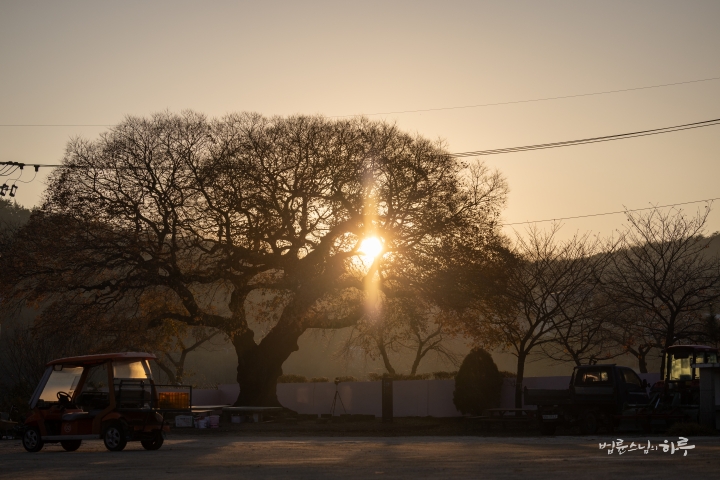
After completing morning practice and meditation, the kimchi-making work began at 7:30 AM. As the sun rose in the clear, cloudless sky, a warm spring-like atmosphere spread. The practitioners started their work with bright faces, shouting words of encouragement.
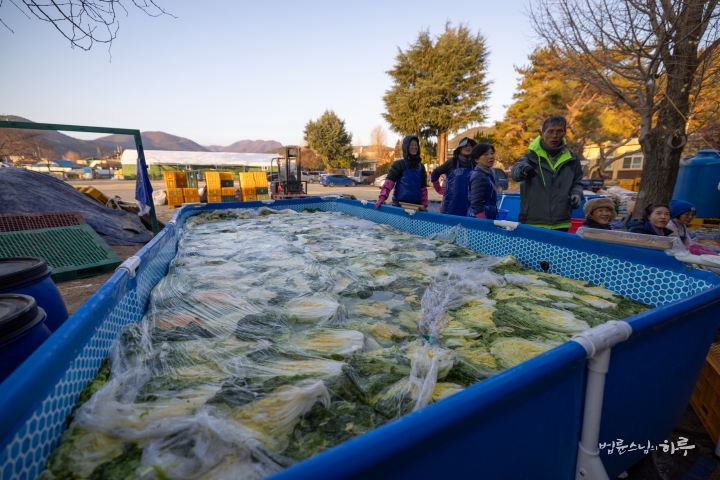
Everyone came wearing work clothes and rubber boots and began by washing the cabbage together.
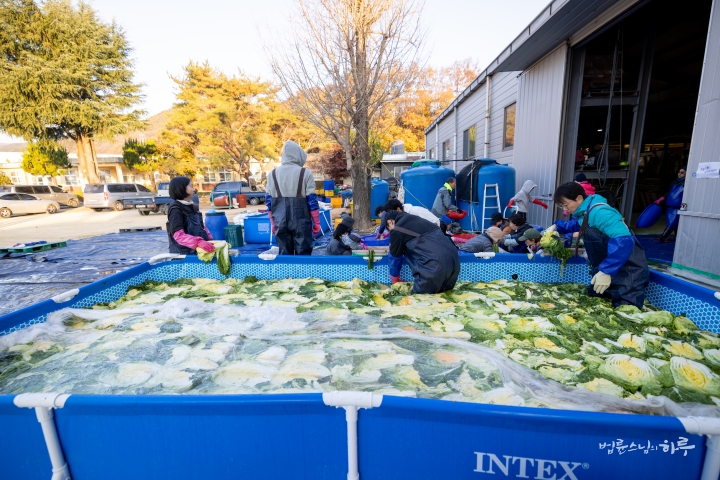
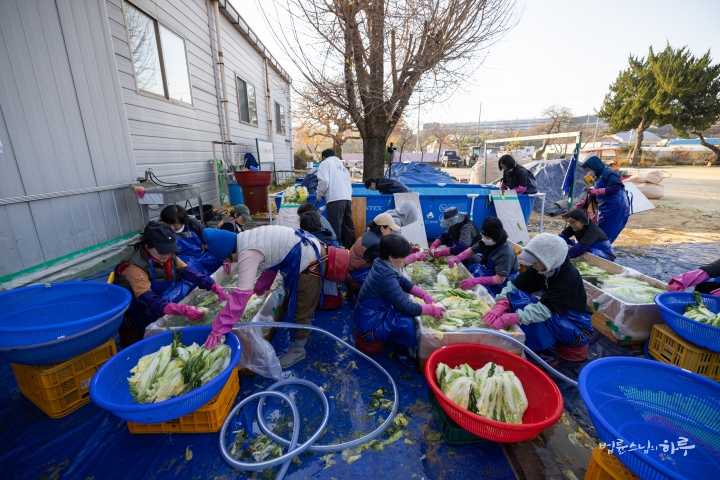
Several practitioners wearing full-body waders entered the large tubs to retrieve the cabbage and place it on slides connected to three-tiered wooden boxes.
“Cabbage coming down!”
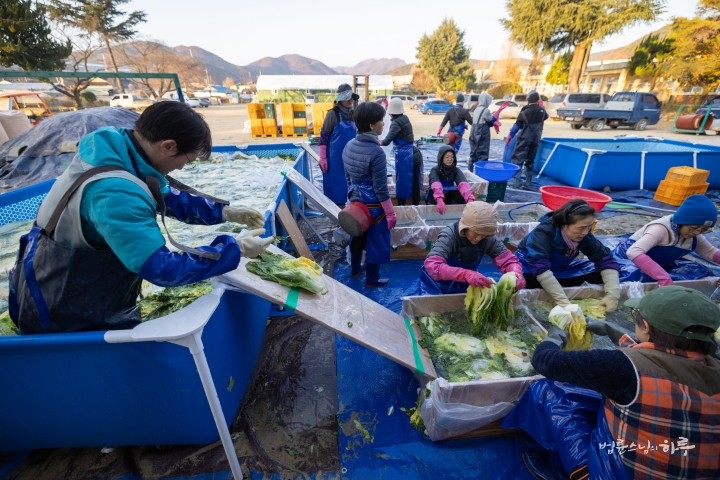
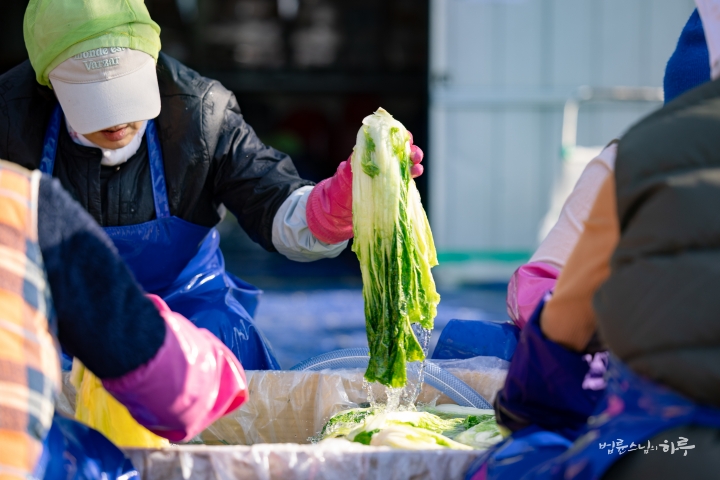
As the cabbage slid down and splashed into the water, people on both sides washed it thoroughly in three stages. Actress Han Hyo-joo, who was participating in this kimchi-making work, also joined the cabbage washing team and diligently washed cabbage. Inside the warehouse, the cleanly washed cabbage was quickly and neatly stacked. Water continued to drain from the cabbage piled on the slanted pallets.
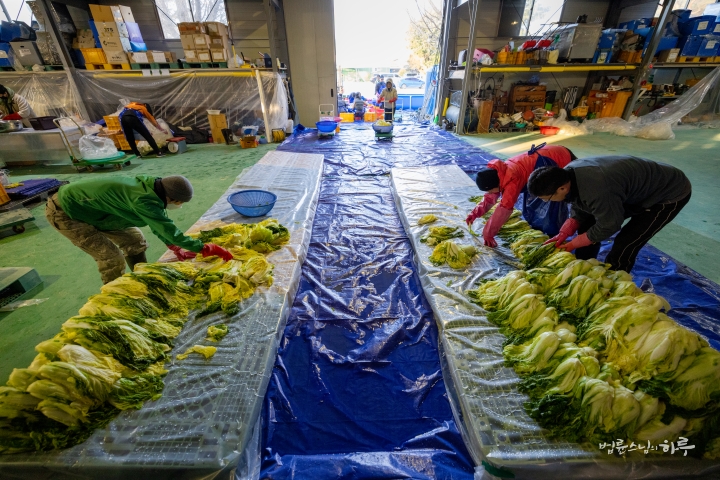
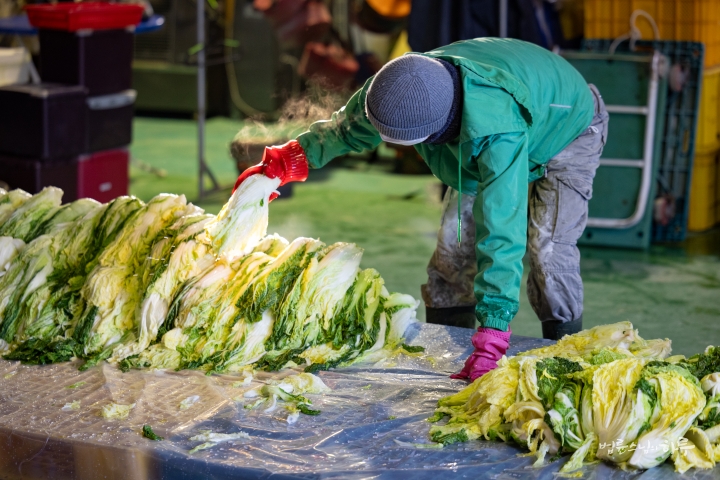
Meanwhile, in one corner of the warehouse, people were sorting radishes to be placed between the cabbage kimchi layers. Although the radish cutting work had been completed yesterday, several people who had tasted the radishes said that some were hollow inside and needed to be sorted out. In the end, 100 new radishes were purchased at the market early in the morning. First, all the hollow radishes were sorted out. Then the newly purchased radishes were washed and cut again.
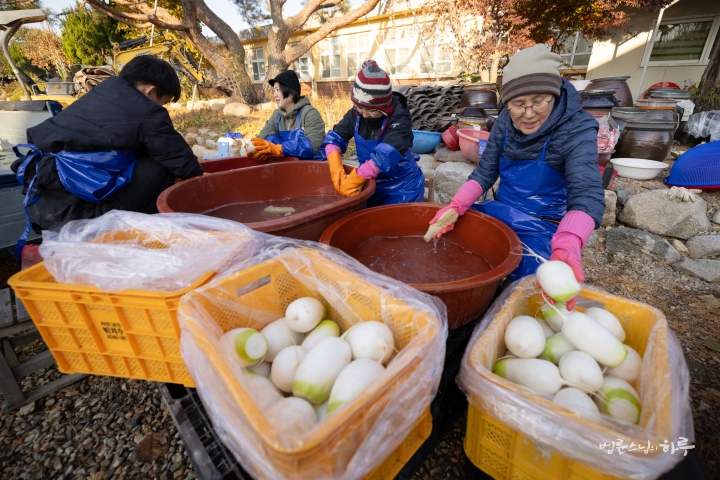
Sunim spent the entire morning with the radish preparation team, sorting out hollow radishes and focusing on cutting the new ones.
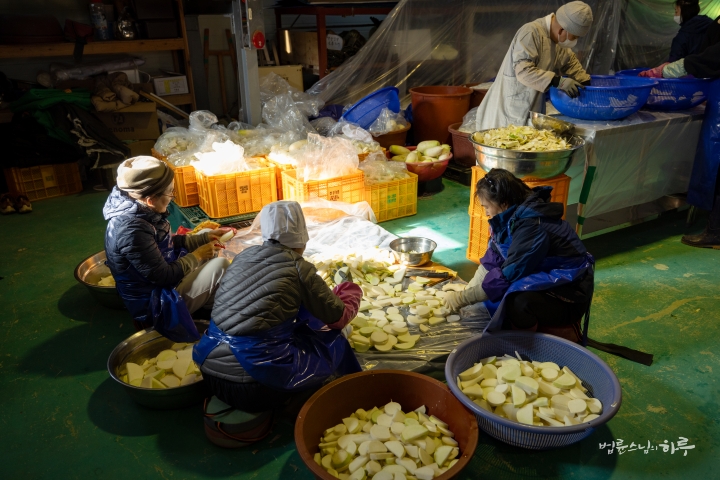
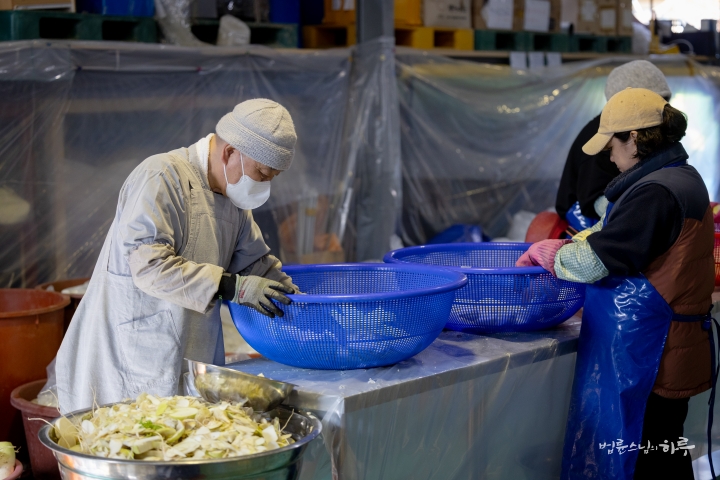
In one corner of the warehouse, the seasoning team was making kimchi filling. They put all the seasoning ingredients in large basins and diligently mixed them evenly with various vegetables to make the kimchi filling.
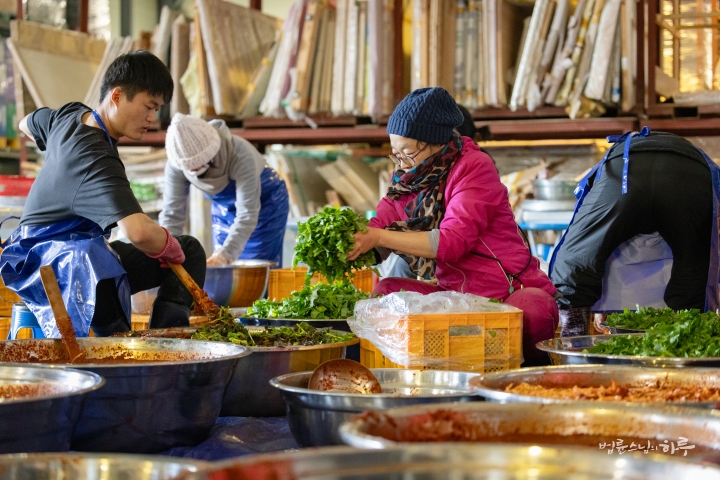
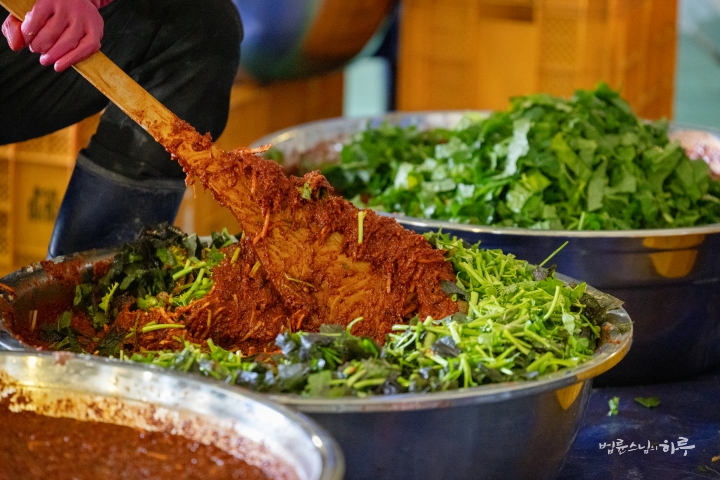
After focusing on washing cabbage all morning, all the cabbage was washed before lunch. While waiting for the water to drain from the cabbage, it was decided to have lunch first.
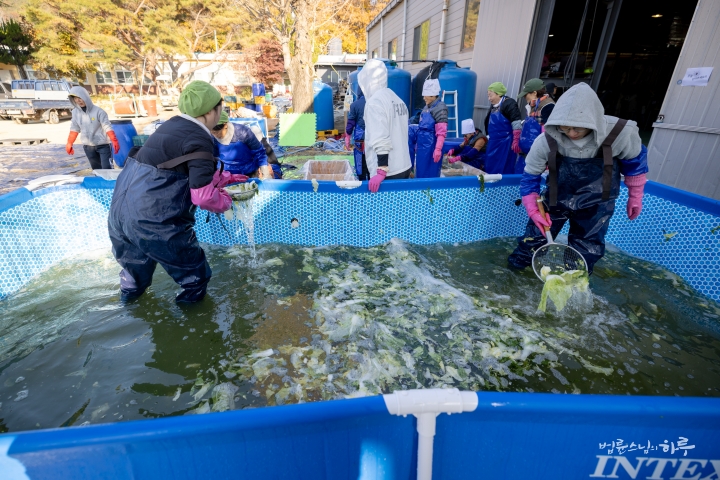
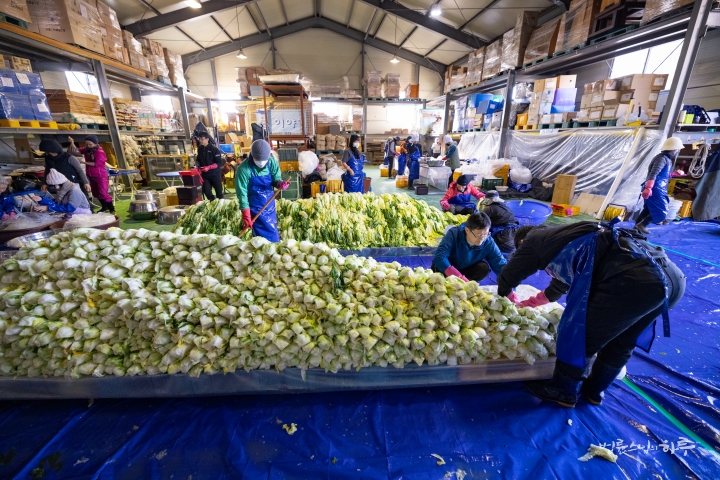
“Good work, everyone. Let’s eat and rest before continuing.”
While everyone went to eat, Sunim headed to the village hall. Since this year marks the 20th anniversary of Sunim’s father’s passing, he had decided to treat the village elders to a meal. From morning, Buddhist Lay Practitioner Choi Mal-soon and Dharma Teacher Hwagwang had carefully prepared the food. Sunim’s sister also brought various side dishes.
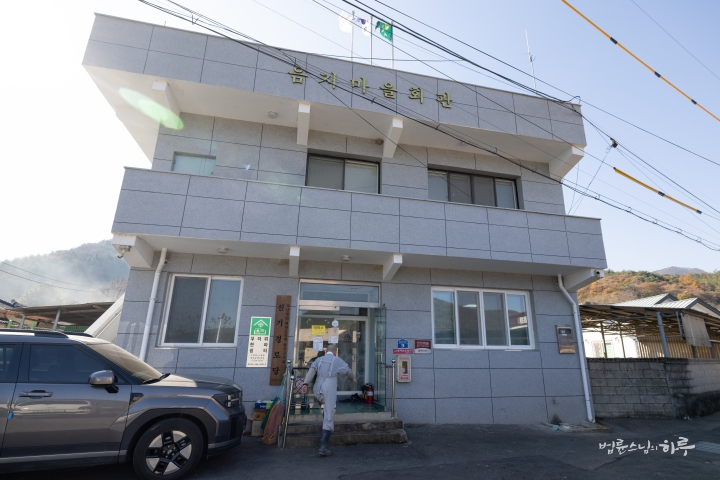
Upon arriving at the village hall, Sunim warmly greeted the village elders.
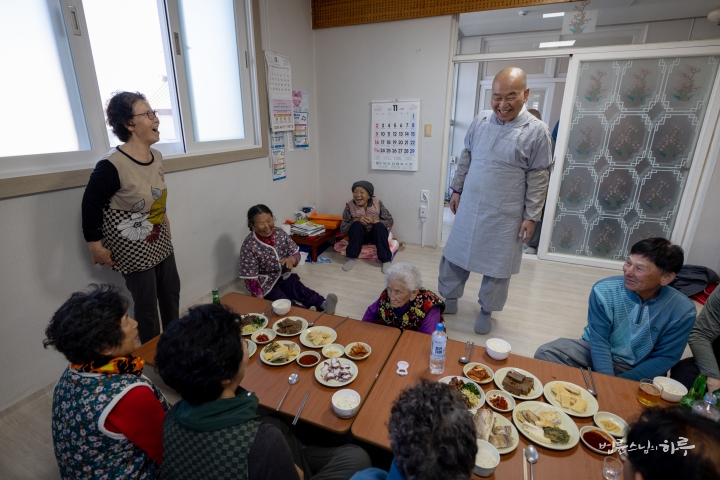
“Thank you for coming. Please enjoy the meal.”
“I heard it’s already been 20 years since your father passed away.”
“That’s right. That’s why I prepared this meal to share together today.”
The elders expressed their gratitude to Sunim.
“Thank you. You’ve prepared a feast.”
Sunim had a meal with the elders while discussing farming.
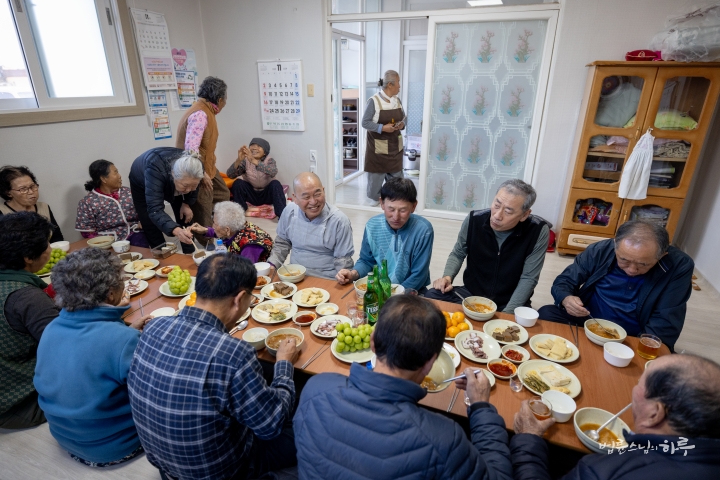
“This year the radish harvest failed, so for the first time we had to buy radishes to make kimchi. This is also my first time experiencing so much rain in autumn. How was everyone’s harvest this year?”
The elders all expressed disappointment that their farming hadn’t gone well either.
“The autumn rain was like the summer monsoon. Here too, it rained continuously for a month and a half. The radish harvest failed, and the cabbage harvest failed too. Rice sprouted on the stalks and turned into broken rice. Fortunately, the rice yield didn’t decrease too much.”
After exchanging greetings and conversing with the elders, Sunim said goodbye to those who had finished their meal and left.
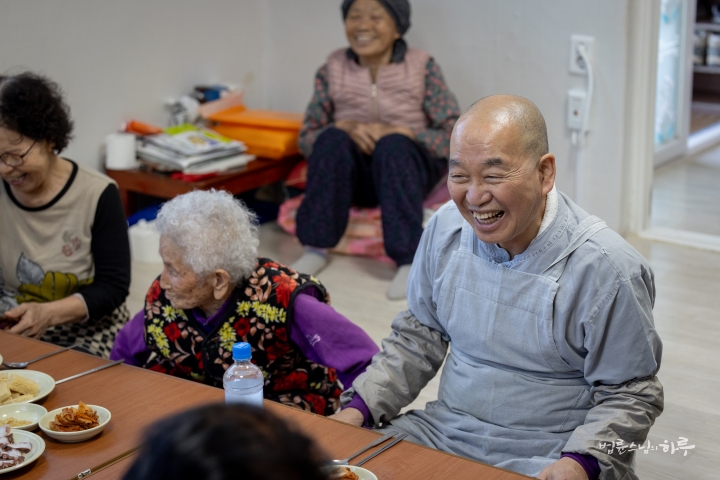
“I came while making kimchi and need to go back to work. Please take your time and enjoy the meal.”
“Thank you, Sunim.”
Sunim left the village hall, took a photo with Dharma Teacher Hwagwang and the volunteers who had prepared the meal, and headed back to Dubuk Retreat Center to continue making kimchi.
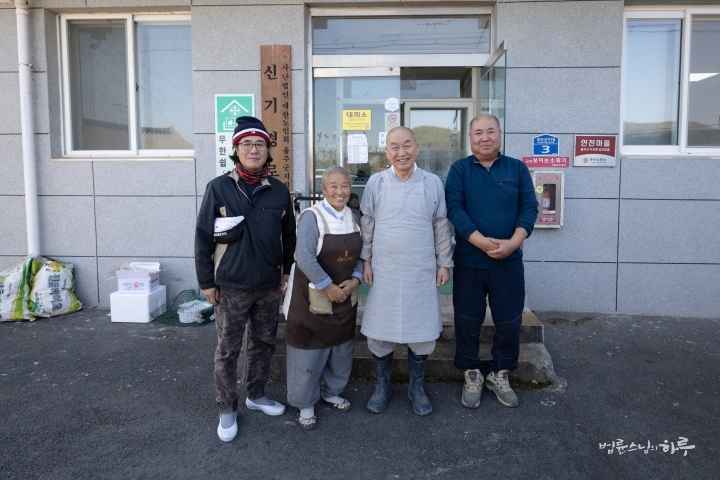
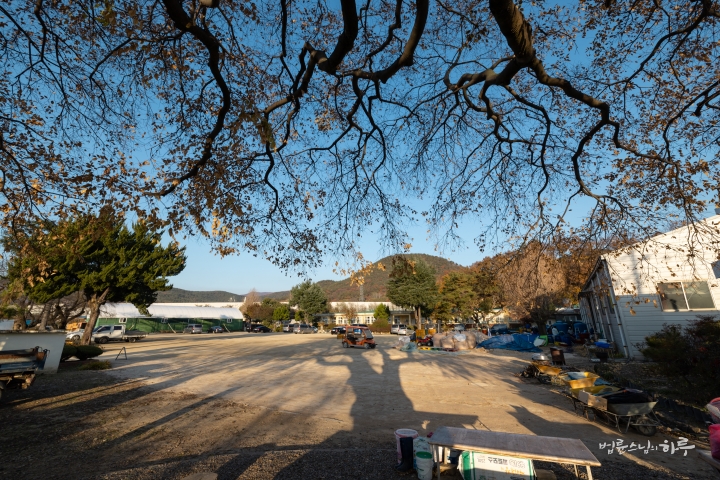
The members also finished lunch and began their work. From the afternoon, they started putting the kimchi filling into the cabbage and mixing it. This is the most time-consuming task.
Before starting the work, Sunim gave brief instructions.
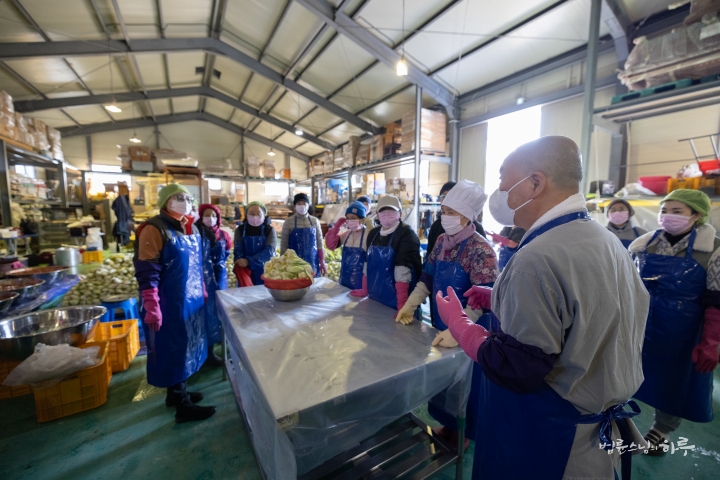
“When you first start mixing, it requires some practice. So don’t package the first ones you make as gifts right away. Use the ones made after you’ve become somewhat skilled for gifts. Last year, the ones made at the beginning were so poorly done that they were difficult to use as gifts. Especially set aside any cabbage that looks too unsightly. You can insert them into empty spaces when packaging gifts later. Please mix and pass along the ones that are large and pretty first.”
Then everyone put on masks and started the kimchi factory in earnest. On one side, people diligently cut and trimmed the bottoms of the salted cabbage.
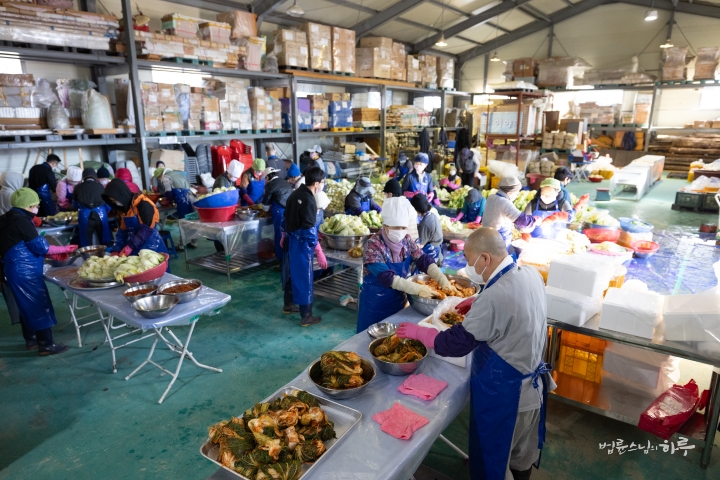
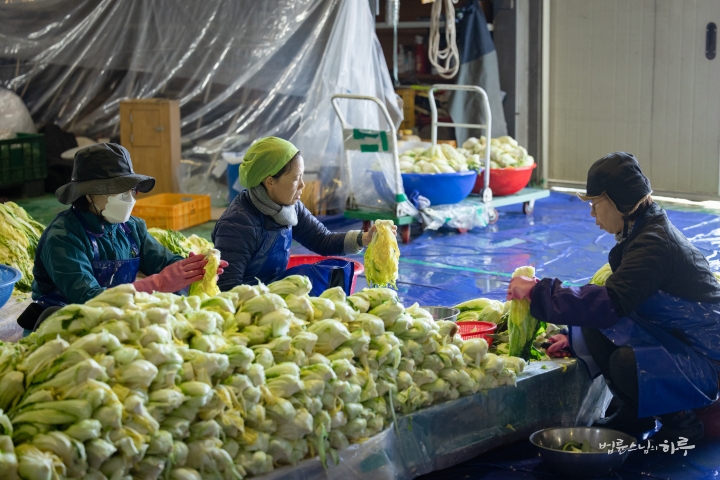
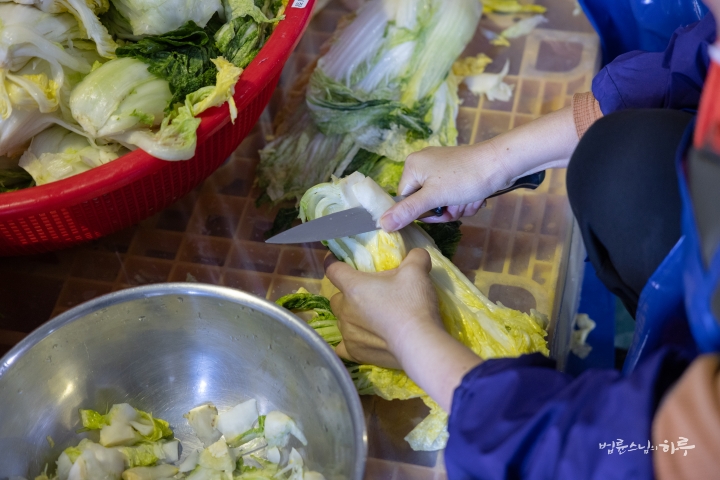
“Please bring some cabbage.”
Several people continuously delivered the trimmed cabbage to the shelves.
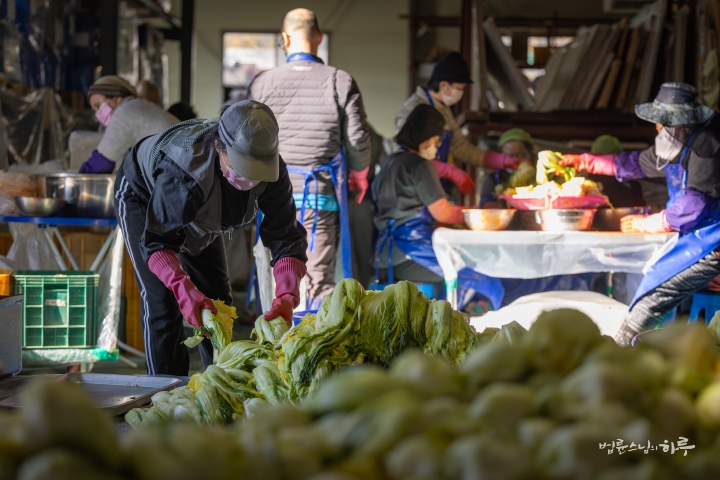
“We’re out of seasoning.”
Several people diligently delivered basins full of kimchi filling. The practitioners in charge of mixing rubbed the kimchi filling all over the cabbage to color it entirely, then filled the spaces between the cabbage leaves with more filling. Finally, they wrapped it with outer leaves to prevent the filling from falling out.
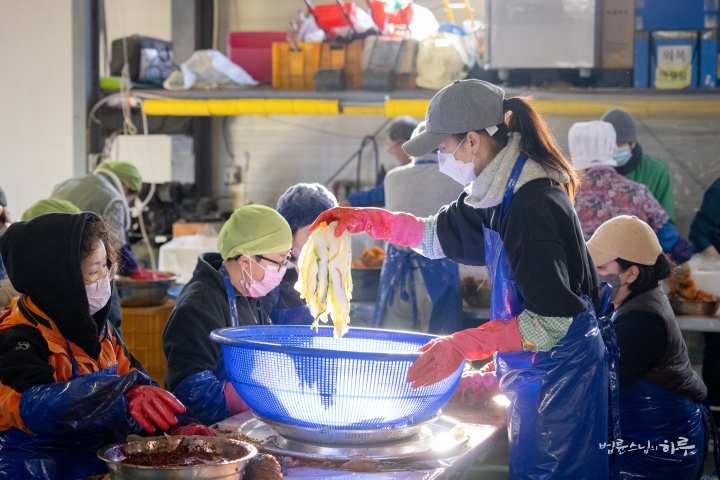
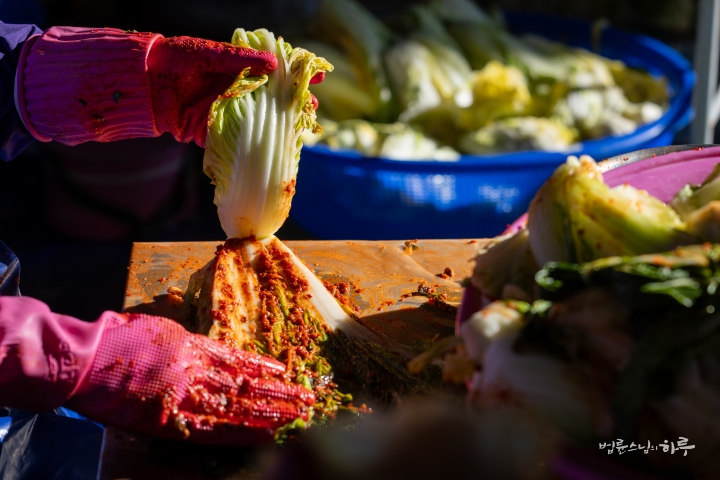
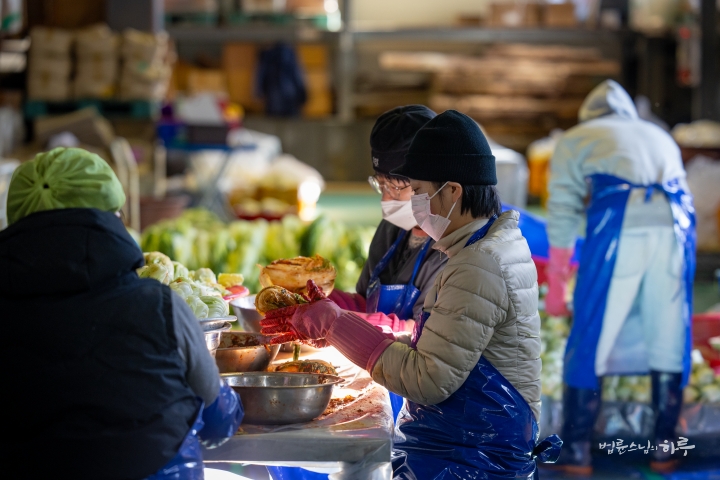
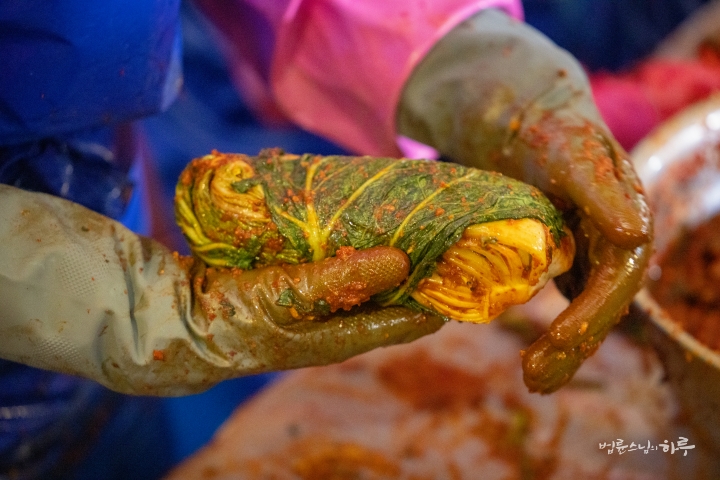
At first, it took a long time due to inexperience, but gradually they got the hang of it and kimchi was made at a rapid pace. Sunim took charge of putting the well-made kimchi into boxes.
“Please bring kimchi!”
“Yes, kimchi coming.”
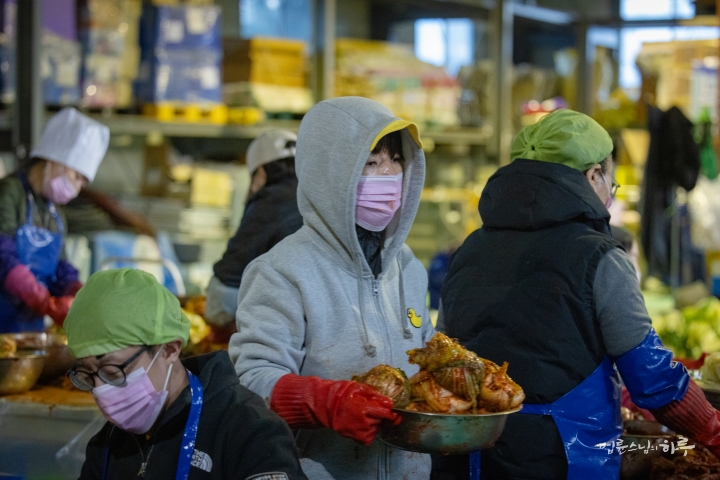
When Sunim called out, practitioners came running.
“Please bring radish!”
“Yes, radish coming.”
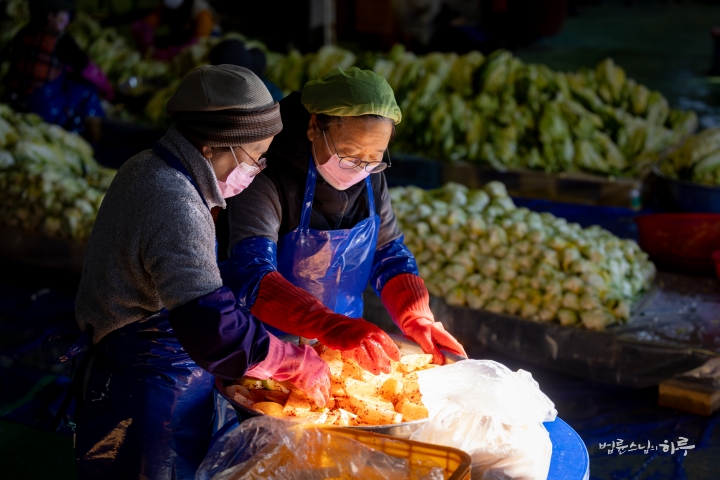
He carefully placed each one with the root ends of the cabbage alternating and the cut surfaces facing up, ensuring the kimchi filling wouldn’t fall out. He also cut remaining radish pieces and placed them between the kimchi.

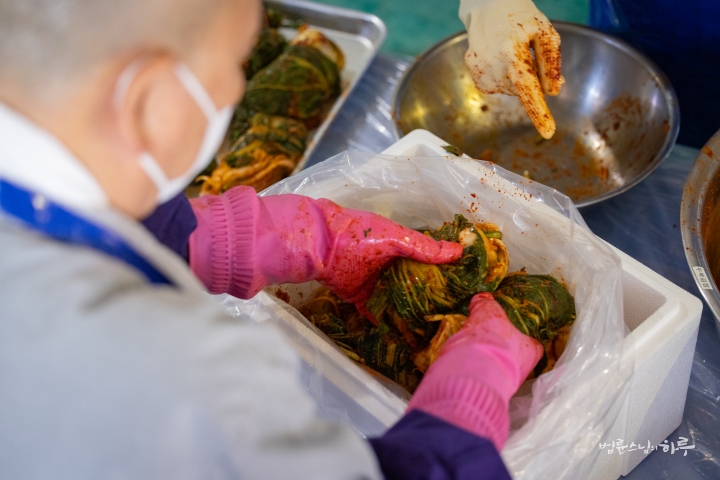
“Who did this? The seasoning is dripping because you didn’t wrap it properly with the outer leaves. Should we implement a name system?” (laughter)
Improperly made kimchi was sent back to the shelves.
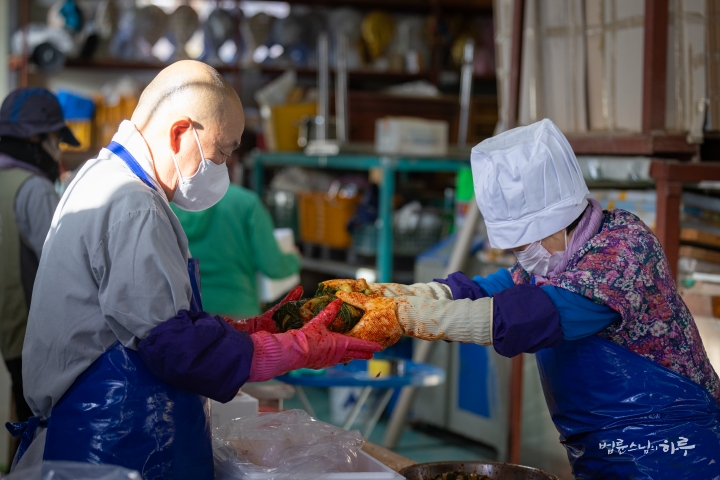
When Sunim packed the kimchi tightly without gaps, the practitioners in charge of packaging moved the boxes, tied the plastic, covered with lids, and sealed with tape. Kimchi boxes were neatly stacked.
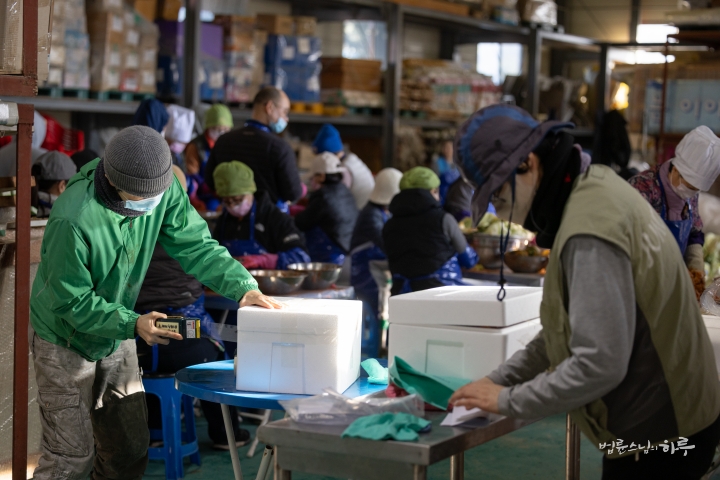
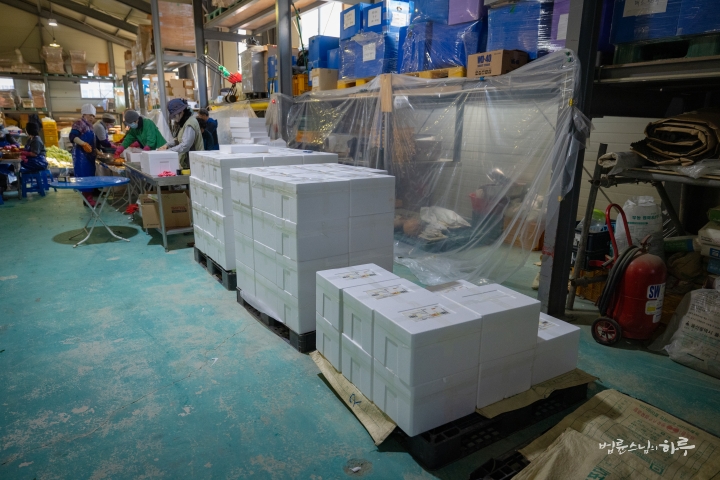
After working for a long time, backs ached and necks became stiff. They took a moment to stretch.
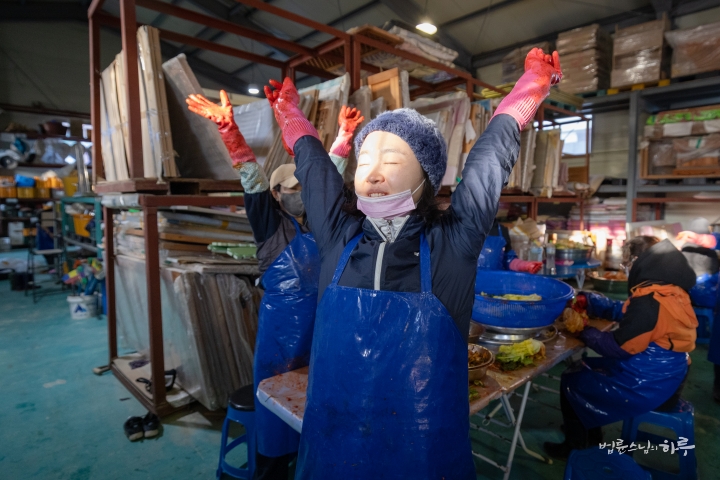
Since everyone was wearing rubber gloves, they just stretched their chests and raised their hands to the sky once before continuing work.
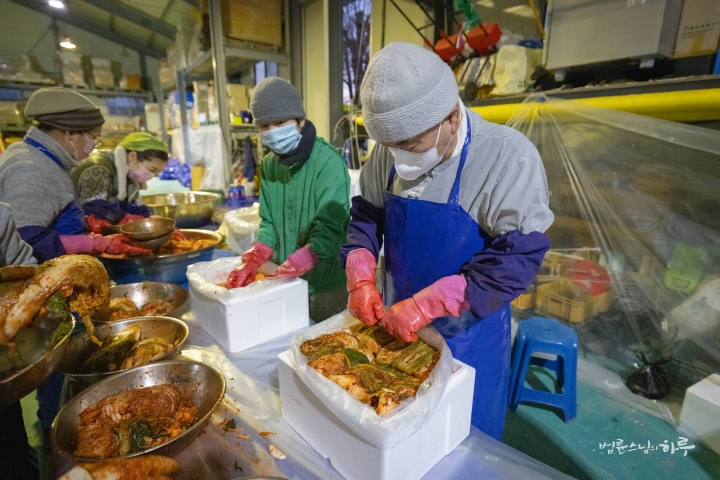
As the sun set, the warehouse became dim. Dharma Teacher Myodang installed lighting in various places.

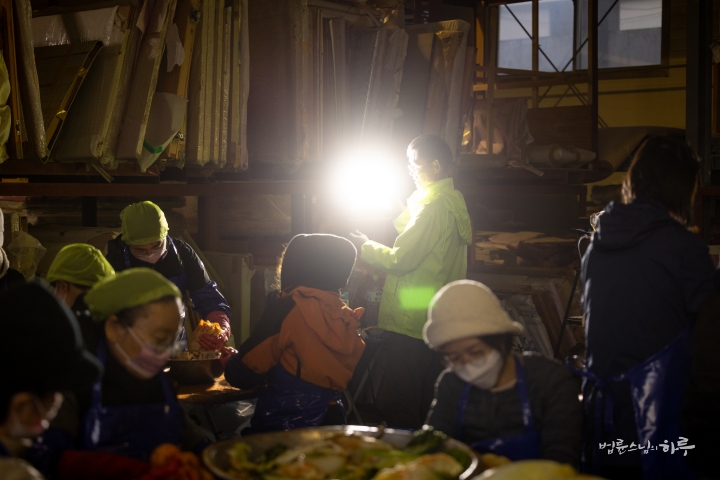
As the warehouse brightened, the kimchi factory regained its vitality. Sunim announced in a loud voice.
“We need to package kimchi as gifts for foreign embassies in Korea. Everyone, please show your skills.”
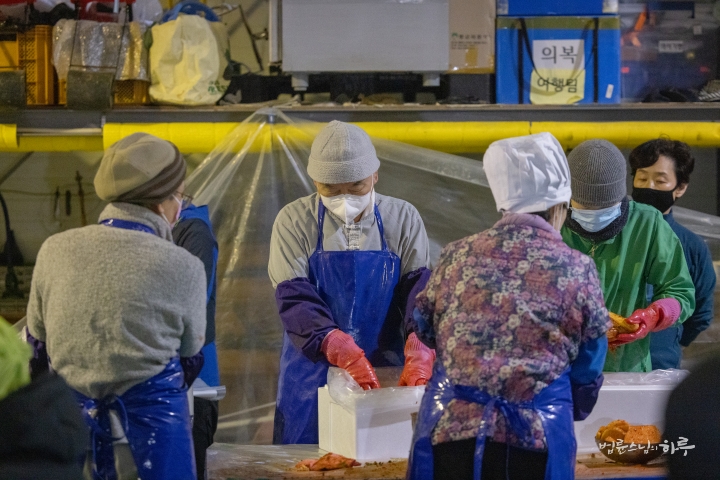
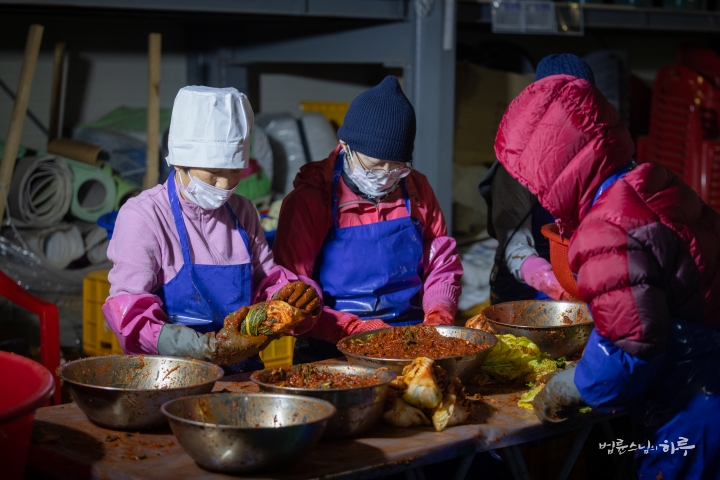
Following Sunim’s instructions, everyone kneaded the kimchi with great care, wrapped it neatly with outer leaves, and finished it tidily. As gift boxes steadily piled up, the sun had completely set before they knew it.
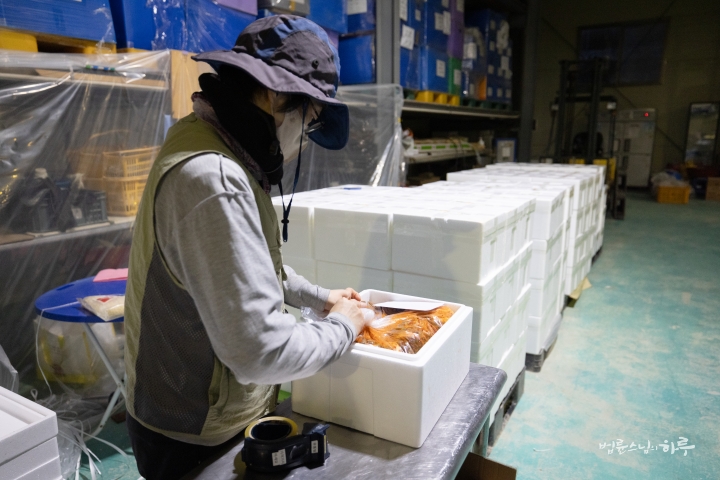

“Let’s have dinner first and then continue the work.”
After warming up with a meal, kimchi-making resumed at 6:40 PM. As they entered the night shift, everyone’s hands moved even faster.
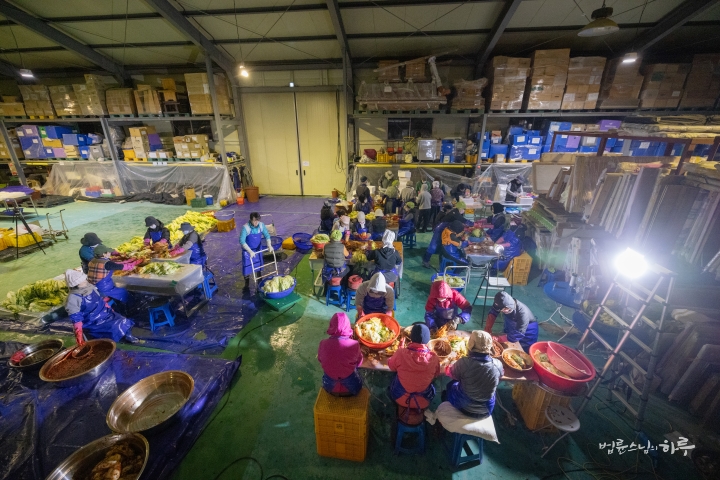
“We’ll finish all the gift kimchi work today.”
With the farming team leader’s energetic voice, the kimchi factory bustled with activity.
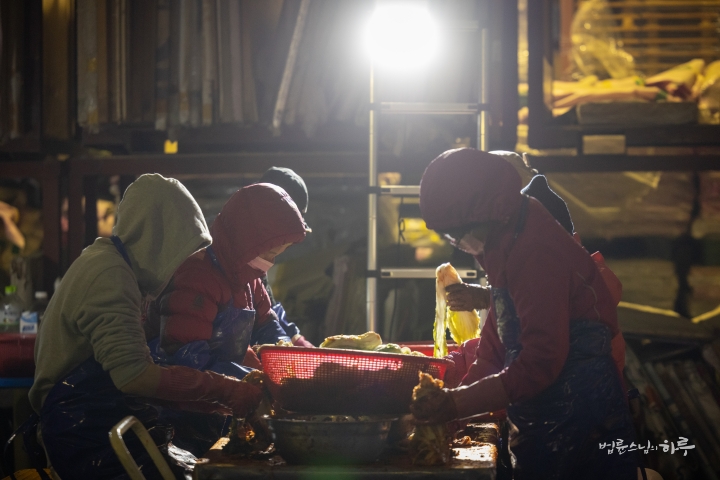
After two hours of diligent work, they completed all the gift kimchi packaging.
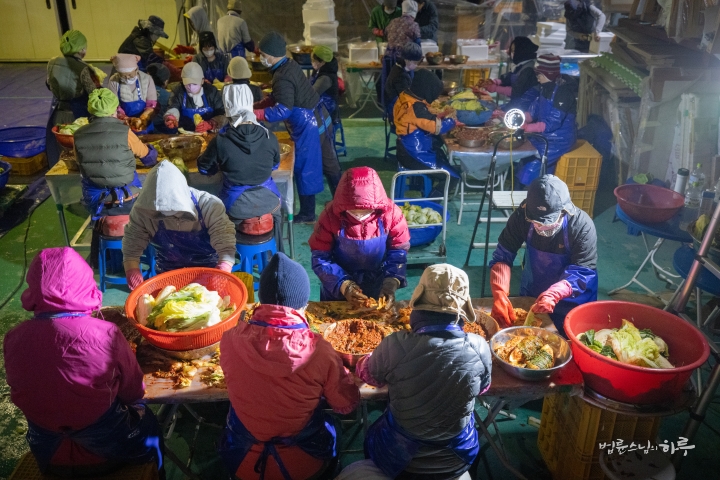
Now only the task of mixing the remaining seasoning with the leftover cabbage and storing it in containers remained. They decided to do the rest tomorrow, and Sunim asked for the members’ understanding.
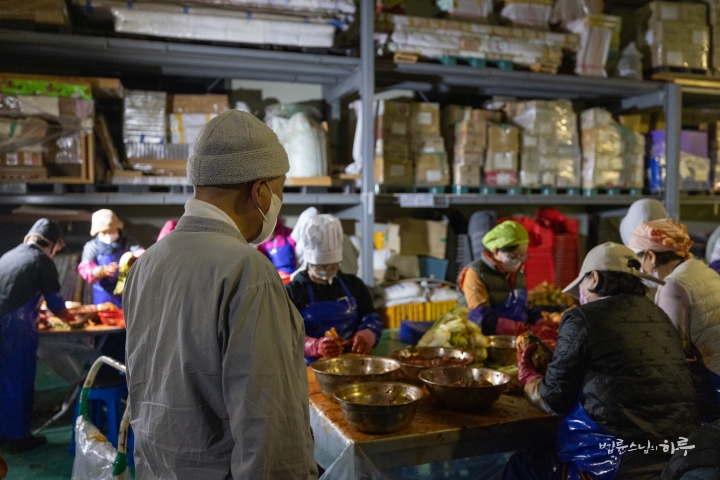
“The head monk Doyeong of Geumsansa Temple has passed away, so I was originally planning to pay my respects briefly during your break time. However, since it seems we’ll finish all the kimchi work today, I’ll go to pay my condolences tomorrow morning. I’m sorry I can’t help with the cleanup. Will you be alright without me?”
“Yes! We’ll take care of it.”
After removing their rubber gloves and boots and doing a simple cleanup, everyone went to bed.
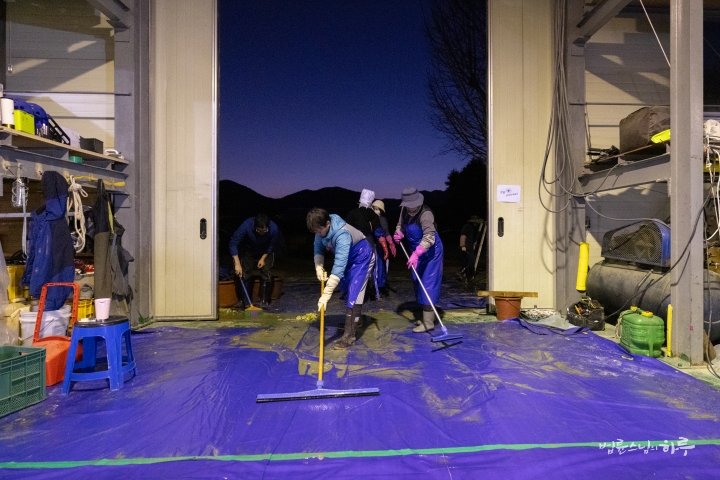
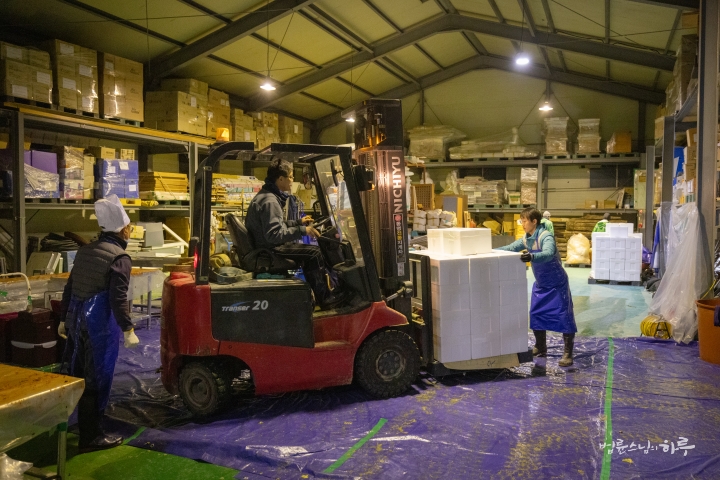
Tomorrow morning, everyone will work together on cleanup and general cleaning, while Sunim will visit the funeral of the head monk Daeyeong of Geumsansa Temple. In the afternoon, they’ll have a rest period, and in the evening, they plan to have a dialogue session with Sunim.
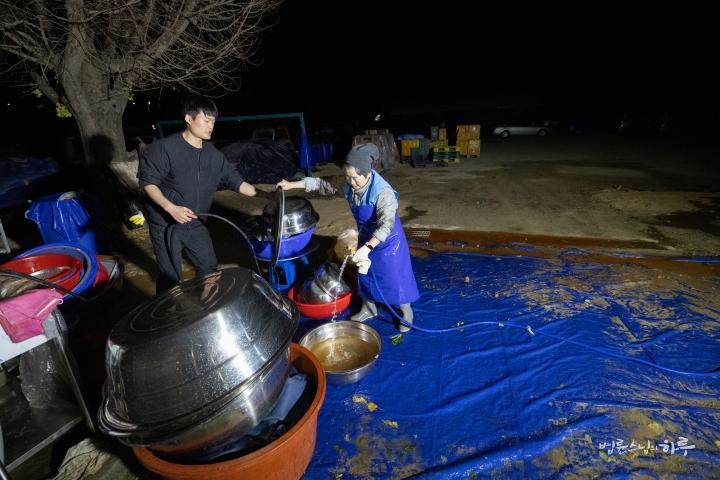
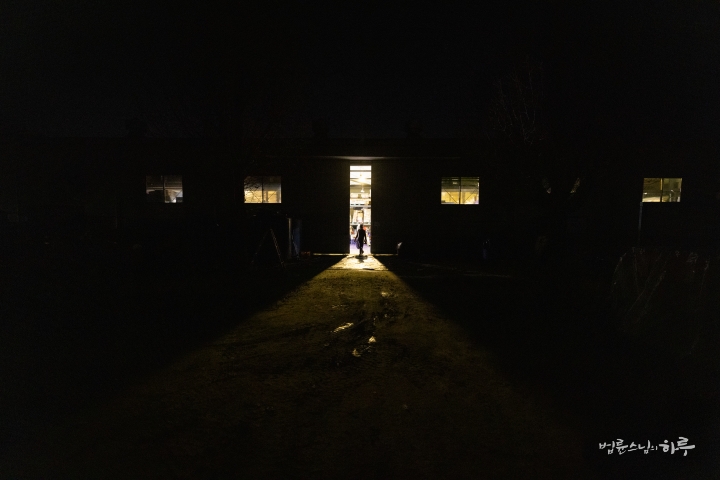
Since there was no Dharma talk today, we will conclude by sharing a dialogue between a questioner and Sunim from a lecture hosted by ‘Gilbeot,’ a gathering of broadcasting, film, theater, and arts professionals, on the 13th of last month.

How Should I Deal with Someone Who Gets Angry and Then Says ‘It Was Just My Opinion’?
“This is ultimately your own issue. Whether someone speaks angrily or has a rough tone, if you respond with the same anger, you could actually be considered more unreasonable. Initially, you might get excited along with them because you don’t know their tendencies. But after experiencing it a few times, you can understand their speech patterns and personality. From then on, you can respond calmly according to their style.”
“My concern is that this person doesn’t get angry at everyone, but only at those they perceive as pushovers. Since I don’t get angry, I wonder if they see me as even more of a pushover.”
“Then you can experiment yourself. If you think they’re treating you as a pushover because you stay quiet, try responding strongly once. Based on their reaction, if you judge that you should be more assertive going forward, do so. If being too strong might break the team atmosphere, consider the side effects and take a step back. This isn’t cowardice but wise response. If yielding a little to the other person resolves the situation smoothly, it’s not servility but wisdom.”
“For example, just because our country’s president gives a medal to the U.S. president doesn’t necessarily mean it’s servile. It could be a strategy to flexibly manage international relations. Even in situations that seem unfair and anger-inducing to others, smoothing the atmosphere to get past the problem might actually be more beneficial.”
“How others see it isn’t important. What’s more important is judging which response benefits you. If you endure because you lack power, that could be servile. However, if you adjust between hardline and conciliatory approaches by choosing the more advantageous direction for problem-solving, that’s a wise choice. Diplomacy works the same way. You identify the other party’s strengths and weaknesses, sometimes using force appropriately, sometimes utilizing gifts or consideration. You’ll meet various people in the future, and among them, there might be those who aren’t just difficult in personality but seem problematic overall. In such cases, you don’t have to deal with them. However, if you can’t avoid them due to entangled interests, you have no choice but to adjust the relationship according to their tendencies.”
“Just as we use machines according to their principles, we must also converse with people according to their characteristics. Understanding that there are principles in human relationships makes things much easier.”
“Thank you.”




